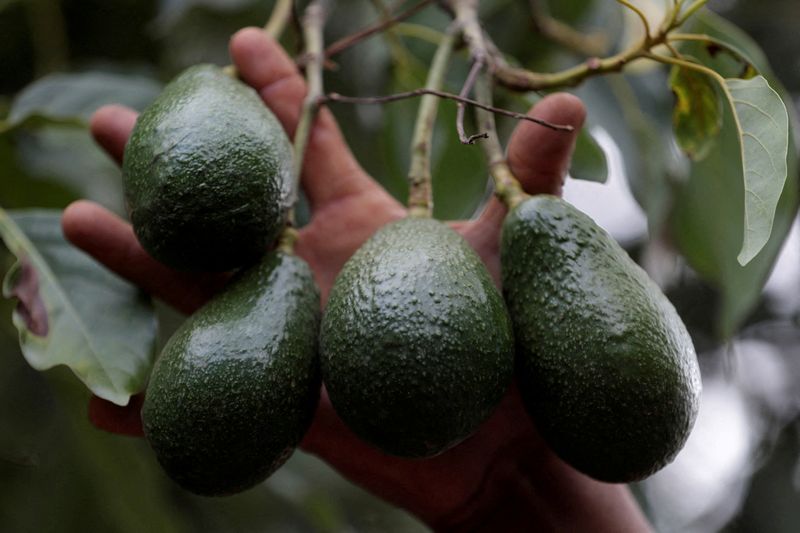By Leah Douglas and Ed White
WASHINGTON/REGINA, Saskatchewan (Reuters) -U.S. prices may rise next year for avocados, strawberries and other fresh produce, and consumers could face shortages, if President-elect Donald Trump follows through on plans to slap tariffs on goods from Mexico and Canada, agricultural economists and industry executives said.
Mexico and Canada are by far the top two suppliers of farm products to the United States, with imports of agricultural goods valued at nearly $86 billion last year, according to U.S. Department of Agriculture and U.S. Customs data.
Duties on their food shipments could cause jarring financial and operational ripple effects on U.S. supplies and highlight how reliant the nation has become on its neighbors for feeding its population, economists said.
Trump said Monday he would sign an executive order on his first day in office in January that would impose a 25% tariff on all products coming into the United States from Canada and Mexico to curb the flow of illegal drugs and migrants into the U.S.
U.S. consumers would feel impacts at grocery stores and restaurants, with items being out of stock, Lance Jungmeyer, president of the Fresh Produce Association of the Americas, said on Tuesday.
"We would see fewer items in general in the produce section," Jungmeyer said. "Restaurants would have to reconfigure their menus, maybe putting in less fruits and vegetables or decreasing portions."
About two-thirds of all U.S. vegetable imports and half of fruit and nut imports come from Mexico, according to the USDA: nearly 90% of its avocados, as much as 35% of its orange juice, and 20% of its strawberries.
Avocado exports to the United States have soared 48% since 2019, according to U.S. trade data, as consumers have increasingly put them in salads and on sandwiches. The U.S. market accounts for about 80% of Mexico's total avocado exports, data by the USDA shows, a trade worth $3 billion last year.
"It would generate an inflationary spiral," said Alfredo Ramírez, governor of Michoacan, Mexico's main avocado producing state.
"Demand would not fall," he said. "What would increase are costs and prices. This would bring us an increase in inflation and direct repercussions for consumers."
Margarita supplies could be hit, too. Imports of beer and tequila together make up nearly a quarter of Mexican imports of agricultural goods into the U.S. last year. U.S. imports of Mexican tequila and mezcal - both used for making cocktails, such as margaritas - totaled $4.66 billion in 2023, up 160% since 2019, according to data from the Distilled Spirits Council of the United States.
"Tariffs on spirits products from our neighbors to the north and south are going to hurt U.S. consumers and lead to job losses across the U.S. hospitality industry just as these businesses continue their long recovery from the pandemic," the group said.
The tariffs could also push prices higher for fertilizer imported from Canada at a time when farmers are paying nearly 50% more for fertilizer than in 2020, said Sam Kieffer, vice president of public policy for the American Farm Bureau Federation, a farmer trade group.
"Now is not the time to send shock waves through the agricultural economy," Kieffer said.
PIGS, CATTLE MIGRATION
Trump's plan could also slow the migration of more than 1 million cows exported by Mexico across the border each year, to become part of the U.S. beef supply.
U.S. producers have slashed their cattle herds in recent years, pushing up beef prices. They could benefit if tariffs lead to fewer cattle and beef imports, said Bill Bullard, chief executive officer of the Ranchers Cattlemen Action (WA:ACT) Legal Fund United Stockgrowers of America.
Tariffs could also further increase meat prices for U.S. consumers, though Bullard said importers and meat processors may be able to absorb some extra costs.
"We look forward to tariffs," he said. "It will help to level the playing field for our domestic producers."
To the north, tariffs also could disrupt shipments of beef and dairy cattle and hogs between the U.S. and Canada, and potentially affect producers in both countries.
Manitoba alone sends about 3 million piglets each year to producers in Iowa, Minnesota, South Dakota and Nebraska, where feed corn can be sourced more cheaply, according to the Canada Pork Council and Manitoba Pork Council
Midwestern farmers then raise and fatten up the animals in their feeder barns, before sending them to slaughter - and the pork flows both to buyers in the U.S. and Canada after processing.
TRUMP TRADE WARS 2.0
The latest USDA projections show that the U.S. in 2025 will likely run a deficit in agricultural trade of more than $42 billion, driven in part by consumer interest in off-season produce and imported alcohol from Mexico.

The threat of tariffs could be a way of attaining leverage over Mexico and Canada in the lead-up to renegotiation of the USMCA trade deal, set to be reviewed in 2026, said Peter Tabor, an attorney and senior policy advisor at Holland & Knight and a former USDA trade official.
But implementation of steep tariffs over time could mean the U.S. may be seen as an unreliable trading partner and that importers of U.S. goods would look elsewhere to fill the void, Tabor said.
